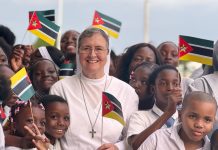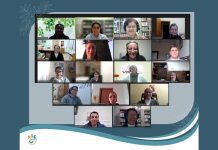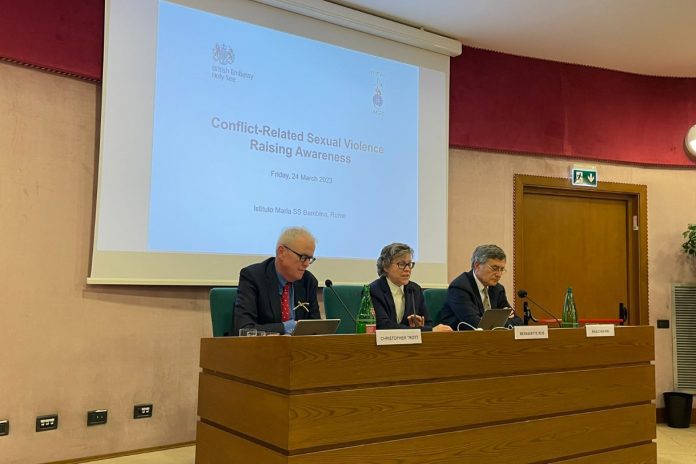Rome (Italy). On 24 March 2023, Sr. Chanda Nsofwa and Sr. Lolia Annie Pfozhumai, from the Youth Ministry Sector of the Institute of the Daughters of Mary Help of Christians, participated in the round table Conflict-Related Sexual Violence Raising Awareness, organized at the Institute Maria SS Bambina in Rome by the British Embassy to the Holy See and by the World Union of Catholic Women (WUCWO).
The aim of the Symposium was to raise public awareness of sexual violence as a weapon of war in conflicts around the world, and to highlight the need for a more incisive global response to this crime and the crucial role played by religious networks in supporting and accompanying women and girls with their families. Almost ten years after the global summit on the subject, held in 2014 in the United Kingdom, conflict-related sexual violence continues to mark lives and communities.
Testimonies in the field highlighted the work carried out in conflict zones by the network of men and women religious in support of women. The roundtable also addressed the role of the media in raising awareness.
The invitation of the moderator, Sister Bernadette Reis, Editorial Director of the Dicastery for Communication of the Holy See, not to remain indifferent to the suffering of women and girls, was taken up and reiterated by the British Ambassador to the Holy See, Christopher Trott, who illustrated the global scenario.
Dr. Paolo Ruffini, Prefect of the Dicastery for Communication, reflected on the tendency to ask for God’s presence in the midst of suffering, instead of asking “where are we”, due to the human instinct to avoid responsibility in the face of suffering of their fellow human beings who are deprived of their dignity, while we are in an era in which we are aware of situations related to conflicts. Hence, the invitation to behave in accordance with the truth, as Pope Francis did during his apostolic visit to the Democratic Republic of Congo by telling the victims, “Your tears are my tears; your pain is my pain. To every family in mourning or displaced by burned villages and other war crimes, to the survivors of sexual violence, to every injured child and adult, I say, I am with you, I would like to bring you God’s caress.”
Among those who shared their experiences was a young woman from the DR Congo, a victim of violence and now an activist for women, who gave her testimony underlining the importance of the education she received from the Jesuits of the Jesuit Relief Service, who helped her get back on her feet. The importance of accompaniment and education was also affirmed by Father Bernard Ugeux, a missionary in Africa.
Sr. Barbra, a Sister who has worked with war survivors in South Sudan, shared her experience towards healing from trauma in the heart and body, because “trauma shouldn’t be a life sentence.” Sr. Barbra uses artistic paintings in accompanying victims, as a way to represent the reality that people live, beyond what can be expressed with words.
Natalia Holynska, head of projects to combat trafficking in human beings of Caritas Ukraine, spoke of the emotional and psychic disturbance experienced by victims of sexual violence in conflicts, asking “not to forget Ukraine”. Dr. Andrea Atzori, representative of the University College of Aspiring Missionary Doctors (CUAM), also spoke of suffering and trauma, and of the precious presence of the Sisters alongside the suffering people.
The testimony of journalist Elizabeth Pique highlighted the challenges of adequate information. Finally, the President of the World Union of Catholic Women’s Organizations (WUCWO), María Lía Zervino, invited the participants to raise public awareness for a more effective global response to conflict-related sexual violence, which affects both genders.
Listening to what emerged during the Symposium, the collaborators of the Youth Ministry Sector strengthened the conviction that, in order to be more effective in the educational mission among young people, especially among the most vulnerable children and young women, it is necessary to network with other organizations, institutions, governments, non-governmental organizations, and people involved in the defense of human rights.
In the commitment to educate to active citizenship for a supportive society, the FMA form young people to be active and critical peace builders. Socio-political education, inspired by the teaching of the Church’s social doctrine, must therefore be translated into courses of formation in peace, democracy, and political participation for the common good. In this direction, the Preventive System, an original synthesis of education and evangelization, directs young people to become “good Christians and honest citizens”.




















